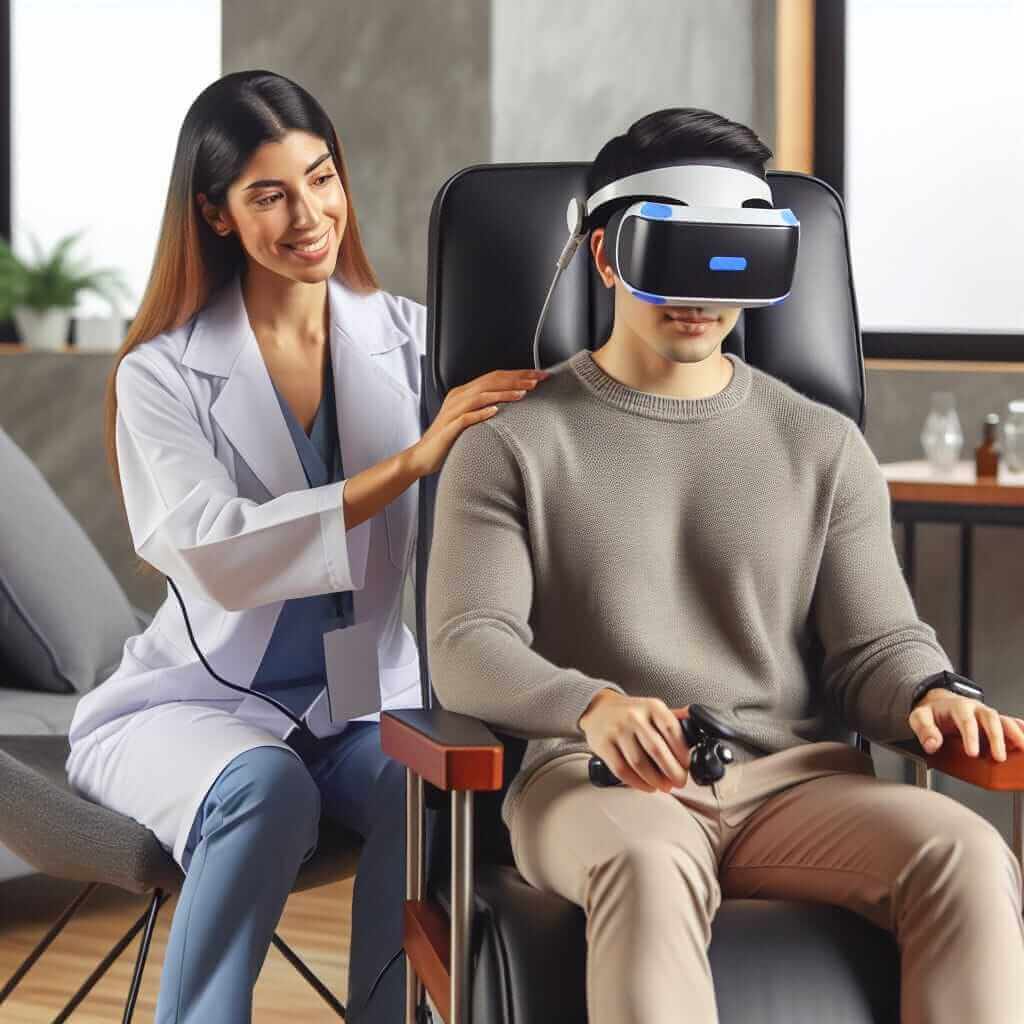When it comes to the innovative use of technology in healthcare, one cannot overlook the expanding role of virtual reality (VR) in mental health treatment. This essay explores various aspects of how VR is being integrated and its effectiveness in addressing various mental health issues.
Introduction
The use of virtual reality in mental health treatment is a burgeoning field that promises new avenues for therapy and intervention. With the advancement of technology, VR is not just for gaming and entertainment anymore; it has significant potential in therapeutic applications. In this essay, we’ll delve into the evolution and impact of VR in mental health.
Possible IELTS Writing Task 2 Topic:
- Discuss the advantages and disadvantages of using virtual reality in mental health treatment.
- Virtual reality could change the way mental health issues are treated. To what extent do you agree or disagree with this statement?
- What are the potential risks and benefits of incorporating virtual reality into traditional mental health treatments?
Selected Topic:
“Virtual reality could change the way mental health issues are treated. To what extent do you agree or disagree with this statement?”
Task Analysis
Understanding the prompt is crucial. The essay should:
- Clearly state the extent to which you agree or disagree.
- Provide arguments that support your stance.
- Use examples to illustrate these arguments.
- Discuss potential counterpoints and refute them logically.
Sample Essay
Virtual reality (VR) is gaining traction as a formidable tool in the realm of mental health treatment. I strongly agree that VR could revolutionize the way we address mental health issues. This essay will discuss the benefits of VR in mental health treatment, including enhanced engagement, improved accessibility, and its effectiveness in exposure therapy.
One of the most significant advantages of VR is its ability to create a highly engaging environment for patients. Traditional methods sometimes fail to capture the attention of patients, particularly those suffering from conditions such as depression or anxiety. However, VR uses immersive environments to sustain patient engagement. For example, VR can simulate calming landscapes which can help in mindfulness practices and reduce stress levels significantly.
Another compelling benefit is the increased accessibility to mental health care that VR provides. Geographical barriers often prevent individuals from seeking the help they need. VR can bridge this gap by offering remote therapy sessions. Patients can access tailored treatment programs from their homes, thereby democratizing mental health care.
Perhaps the most impactful application of VR is its efficacy in exposure therapy. Exposure therapy is commonly used for treating phobias and post-traumatic stress disorder (PTSD). VR creates controlled environments where patients can confront their anxieties gradually. This controlled exposure can make desensitization safer and more effective. Research has shown that VR-based exposure therapy significantly reduces symptoms in patients with PTSD.
However, it is essential to consider the potential drawbacks. Critics argue that the cost of VR technology may be prohibitive for some clinics and patients. Additionally, there are concerns about the long-term effects of VR exposure. Nonetheless, as technology advances, costs are likely to decrease, and ongoing research will address health implications, mitigating these concerns.
In conclusion, VR offers numerous advantages that suggest it could transform mental health treatment. While there are valid concerns, the potential benefits, particularly in terms of engagement, accessibility, and effectiveness in exposure therapy, are compelling reasons to integrate VR into mental health care. Therefore, I firmly believe that VR will significantly change the landscape of mental health treatment in the coming years.
Word Count: 332

Key Points to Consider when Writing on This Topic
- Vocabulary Usage: Utilize medical and psychological terms correctly. For instance, terms like “exposure therapy,” “desensitization,” and “mindfulness” should be used aptly.
- Structure and Coherence: Follow a clear structure with an introduction, body paragraphs that present arguments and counterarguments, and a concise conclusion.
- Grammar and Syntax: Use complex sentences and varied vocabulary but ensure grammatical accuracy.
- Examples and Evidence: Use real-world studies or examples to substantiate claims. Reference research where applicable.
- Balanced Viewpoint: While providing your stance, acknowledge potential counterarguments to show a well-rounded understanding of the topic.
Challenging Vocabulary in This Essay
- Immersive (adj.) /ɪˈmɜːrsɪv/
- Engaging or involving deeply.
- Desensitization (n.) /diːˌsensɪtaɪˈzeɪʃən/
- The reduction of emotional sensitivity.
- Democratizing (v.) /dɪˈmɒkrətaɪzɪŋ/
- Making something accessible to everyone.
- Controlled (adj.) /kənˈtroʊld/
- Done in a manner that ensures a certain level of rigor or regulation.
- Compelling (adj.) /kəmˈpɛlɪŋ/
- Evoking interest or admiration in a powerfully irresistible way.
- Prohibitive (adj.) /proʊˈhɪbɪtɪv/
- Exceeding the financial means of one to pay.
- Mindfulness (n.) /ˈmaɪndfəlnəs/
- The practice of being aware and present in the moment.
- Democratize (v.) /dɪˈmɑːkrətaɪz/
- To make something accessible to everyone.
- Efficacy (n.) /ɪˈfɪkəsi/
- The ability to produce a desired or intended result.
- PTSD (abbr.) /ˌpiː tiː ˌes ˈdiː/
- Post-Traumatic Stress Disorder, a mental health condition triggered by a terrifying event.
Conclusion
Virtual reality is poised to become a transformative tool in mental health care. By engaging patients, increasing accessibility, and providing effective exposure therapy, VR has significant potential. Future IELTS candidates should explore the impacts of technology on various fields, practice using relevant vocabulary, and develop coherent, well-supported arguments to excel in their essays. Possible related practice topics include:
- The impact of technology on healthcare.
- The ethical implications of using advanced technology in mental health.
- The future of mental health treatment in the digital age.